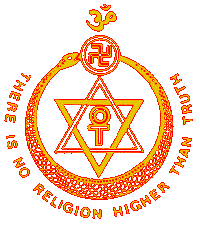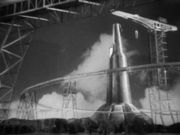Feelgood Theosophy
Welcome to the Feelgood
Lodge

Things to Come (Film 1936)
Based on The Shape of
Things to Come
A novel by H G Wells 1933
A world state as
the solution
to mankind's problems?

The high powered Space Gun of 2036 which
fires a manned rocket to the Moon
Things to Come is a 1936 British science fiction film, produced by
Alexander Korda and directed by William Cameron Menzies. The screenplay was
written by H. G. Wells and is a loose adaptation of his own 1933 novel “The Shape of Things to Come.”
The
story H.G. Wells Things to Come published in 1933 centres on the careers of two
men: John Cabal, leader of the, technocrats who set up the world state, and his
grandson Oswald Cabal, who has to deal with a reactionary backlash. The film
concentrates more on attacking the horrors of war.
The
film was released in February 1936. It has stood the test of time well and
remains a classic of science fiction cinema, a visionary work of compelling
power, awesome imagination and uplifting optimism. The first theme is pacifism
and hatred of war. Prophetically choosing 1940 as its starting date and setting
the action in Everytown, though it is obviously
At
the house of John Cabal (Raymond Massey), the prospects of war are debated and
Cabal insists 'if we don't end war, war will end us'. The children play games
with their toy armaments, until over the wireless it is announced that the
fleet has been bombed without warning, the country is at war and enemy planes
are heading for Everytown. There follows a superbly
staged air raid, a graphic and chilling illustration of Prime Minister Stanley
The
war drags on until 1966 and in its wake comes the plague - the Wandering
Sickness - and the collapse of civilisation. Victims
of the plague are shot to prevent them spreading infection and the pestilence
subsides. Amid the ruins of Everytown, a
quasi-medieval village springs up, with buses turned into houses, cars pulled
by horses and the community led by a charismatic warlord (Rudolf aka the Boss), played by Ralph Richardson, who still leads
armed raids on neighbouring settlements.
The
Boss is challenged by the arrival of the white-haired, black-clad figure of
John Cabal, who declares that he represents an organisation
called 'Wings Over the World' which stand for 'Law and Sanity' and plans to
restore civilisation from its advanced scientific
base on in the mediteranean. Although the Boss arrests
Cabal, a great fleet of airships appears over Everytown
and destroys the Boss’s obsolete air force.They drops
'Peace Gas' bombs, knocking out the population and taking control. Everyone
revives in time except for the Boss, who is found to have died. Those around
conclude that he could not have adapted to the new order.
Cabal
declares that the work of rebuilding must go ahead with the creation of a new
planned, technological society. So the second theme of the film scientific
planning - emerges. 'Planning' was the great panacea of the 1930s. It was based
on faith in the efficacy of reason and science to tackle and overcome whatever
problems faced the nation. The lengthy quasi-documentary sequence detailing the
building of the
At
the end of it, we see Everytown in 2036, a great new
underground city of shining towers, white, clean, clinical, with artificial
light and air, huge television screens and scientifically prolonged life. A
child, being given a history lesson by her grandfather, declares happily: ‘keep
on inventing things and making life lovelier and lovelier.' The latest
invention is the space gun, which will launch a projectile to begin the
exploration of the universe. Oswald Cabal (Raymond Massey), John's grandson,
and Raymond Passworthy (Edward Chapman) discuss the
expedition, on which Passworthy's son and Cabal's
daughter will be the crew.
Passworthy
is fearful, and the people share his fears. The symbol of reaction is Theotocopoulos (Cedric Hardwicke),
sculptor, artist and individualist. He hates the cold, planned, technological
perfection in which they live. He rouses the populace to destroy the space gun,
but before they can reach it, it is launched. Passworthy
asks if there is ever to be any rest.
Feelgood Theosophy
Thankyou for visiting the Feelgood Lodge
______________________
An
independent Theosophical Republic
Worldwide
links to FREE online
Courses,
Writings, Commentaries,